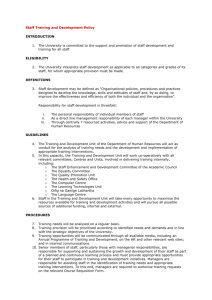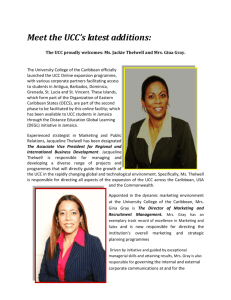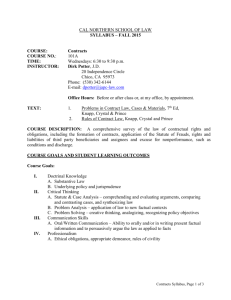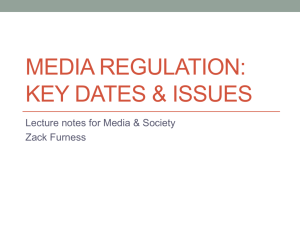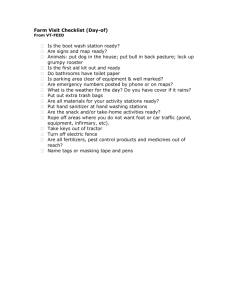powerpoint slides
advertisement
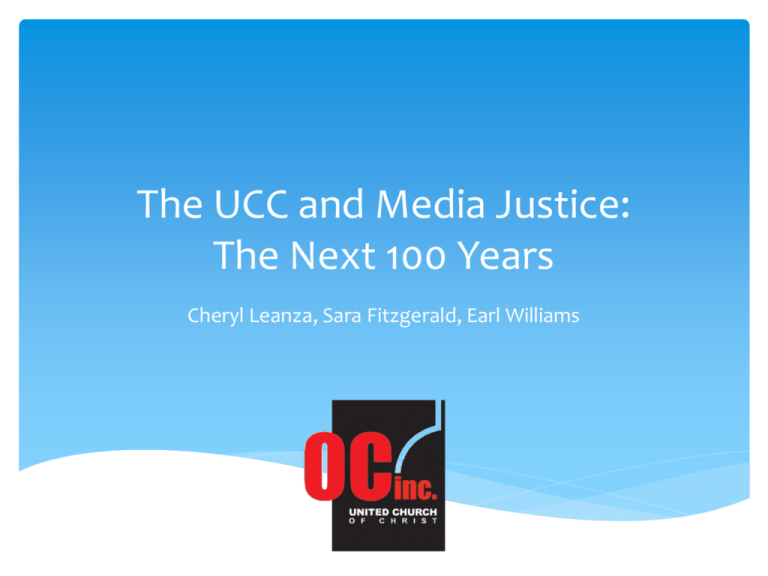
The UCC and Media Justice: The Next 100 Years Cheryl Leanza, Sara Fitzgerald, Earl Williams 1 Media reform is about creating an infrastructure for social justice. Use the media you have, create the media you want. 2 UCC OC Inc.: The Untold Story 3 How Did We Get Started? 1959: UCC communications director Everett C. Parker talks with Rev. Martin Luther King Jr. Begins campaign to improve TV stations in the South to aid the civil rights movement Monitors TV stations in dangerous times Pursues extensive legal proceedings at the Federal Communications Commission (FCC) and court to establish the public’s right to hold broadcasters accountable License of WLBT-TV in Jackson Mississippi is taken away because of the station’s record of racist practices The Result: Ordinary people now have standing to participate 4 OC Inc. Today Continue to advocate on issues related to media justice and media reform Primarily in Washington, but looking for ways to better support grass-roots efforts and to engage local supporters in our work Part-time public policy consultant, backed up by board of directors Seeking ways to integrate more effectively with UCC as a whole, particularly under reorganization 5 Annual Everett C. Parker Lecture Parker Lecture is the only annual lecture that address technology and media from an ethical perspective This year’s lecture: October 1st, 8 AM, First Congregational UCC in downtown Washington DC Dr. Parker celebrated his 100th birthday this year. Hilary Shelton of the NAACP will deliver this year’s lecture. Learn more: www.uccmediajustice.org/parkerlecture2013 6 What’s Wrong with the Media We Have? Our media system is very good, but could be better Not representative of our society Reinforces power disparities Centralized and highly concentrated decisionmaking Opportunities to create content ARE expanding, but some content is still clearly more equal than others, even on the Internet. 7 Media influence every aspect of our lives – values, ethics, behavior, public policy. 8 Former FCC Commissioner Michael Copps put it well: “No matter what your first issue is, media reform needs to be your second issue.” 9 So What Can We Do? Congress, the FCC and other agencies develop media policies that shape our media Changing these policies can help put media in the hands of social justice advocates and help citizens hold corporate media accountable Self-awareness about media and technology impact can also support advocacy on other important issues Coalitions, advocacy and education! 10 Key Opportunities in 2013 Defend and expand access to a telephone, access to Internet for low-income people End predatory prison phone rates Increase media diversity by supporting new lowpower community radio stations Protect free speech on the Internet Fight hate speech against immigrants and LGBT community Media violence fast in September, other technology use awareness opportunities 11 Access to phones and Internet Phone and internet are essential services. Access to jobs, education, homework, doctors, health care portals, caregivers. These are tools that help people improve their lives. Lifeline program is for low-income people—financial subsidy for phone service. Attacks on “Obama phone” unjustified. Reforms in place, need is great. Support expansion to broadband. 12 Predatory Prison Phone Rates “When I was in prison, you visited me” Phone rates to call prison are astronomical – up to 89 cents per minute. Often $300 per month for a weekly call. Money from phone calls is paid to subsidize prisons. FCC can end predatory long-distance rates. We must keep up the public pressure. Upcoming workshop July 10. 13 Prison Phones: What You Can Do Learn more at: www.uccmediajustice.org/prisonphones Learn more about practices in your state, consistent with our JPANet alert this month. Help identify persons who can put a “face” on the problem Arrange to show the motion picture Middle of Nowhere and use OC Inc.’s discussion guide. 14 Media Diversity Problem is with both old and new media Very few radio stations or TV stations owned by women and people of color For more than 15 years, FCC has delayed proposals to improve the collection and analysis of data UCC OC Inc. on the forefront of successfully challenging bad decisions in court and at FCC We notify our supporters when their voices can be heard on regulatory proposals. We need declarations in July in Portland, Phoenix, 15 Seattle, Louisville, Syracuse, others Low-Power Radio Stations New—and rare—opportunity for churches and community groups to create radio stations targeted to underserved communities Deadline rapidly approaching: October 2013 Churches can get their own station, or assist other groups. Provide progressive Christian voice on the airwaves Webinar available at: http://uccmediajustice.org/lpfmaction 16 Free and Open Internet A new opportunity to build the media we want without the problems of the current system. Today, we create our own content, but we don’t pay to distribute it like we used to on television. Open Internet principles ensure basic protections for all Internet users. Obama FCC took some steps, but not enough. Mobile web unprotected. Legal challenges attacking compromise protections. National Council of Churches resolution. 17 Comparing the Old and New Networks Centralized Network Television, Radio, Cable, Hollywood Open Interconnected Network Current voice telephone, postal service Fighting Hate Speech UCC OC Inc. often works closely with National Hispanic Media Coalition, a leader in combatting hate speech. Successful campaign against José Luis “Sin Censura” which contained violently homophobic content Campaign against “John & Ken” Show on Clear Channel radio stations in Los Angeles for their attacks on immigrants, LGBT community, people of color Future opportunities for UCC members to support these campaigns via digital advocacy and other tools 19 communities? Are there examples in your Media Violence/Technology Fasts Studies have demonstrated a stronger connection between violence on television and aggressive behavior in children than between lead exposure and lower IQs On average, our children will see an estimated 100,000 acts of violence on television in the next 10 years In conjunction with International Day of Prayers for Peace, OC Inc. will direct a “violent media fast” September 15-21, 2013. “Screen free week”: May 5-11, 2014. Exploring technology Sabbaths and popular education models for these issues 20 Other Advocacy Areas Limiting inappropriate advertising directed at children, such as marketing that promotes unhealthy food; Promoting greater transparency of money and politics in televised political ads; Helping underrepresented groups take advantage of new technologies; Increased privacy protection for children and others online. 21 Media Justice— How Can You Help?? Participate individually on-line Write letters, call and meet with legislators Leadership role: Education and outreach in church Create materials—sermons, prayers, Synod resolutions Volunteer to organize others Write blog posts, share on social media SIGN UP TODAY! 22 Thanks! Find out more: www.uccmediajustice.org @UCCMediaJustice on Twitter www.facebook.com/uccmediajustice Cheryl Leanza, cleanza@alhmail.com 23

